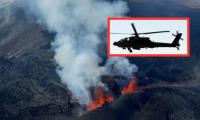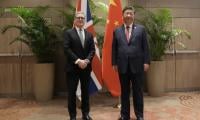Warpath aggravates problems
Head of PPP Media Cell
Wresting of roti and naan from the poor, fleecing the traders under the garb of (IMF) budget, gagging of media and free speech, relentless political victimisation of political opponents, whooping rising prices of goods of common man basket, cutting of the size of (PSDP) likely to render millions of youth unemployed and other millions falling below the poverty line, and devaluation of the local currency to the extent of 40% and double digit inflation have already let the hellfire of price hike loose making the lives of all and sundry terribly miserable. One wonders if any segment of the society is leading life within the comfort zone of this government except the hardcore PTI supporters. Make no mistake that warpath may be trotting out the mutual loss loss situation aggravating the problems. This is irrefutable narrative particularly in a parliamentary democracy where treasury and opposition benches are two wheels of the same vehicle.
The emerging provocative political scenario may surely be untenable and no wonder the serious politicians of substance are predicting the days of incumbent government are numbered. Their forecast may sound plausible in the face of the PTI top leadership’s misplaced bullying that is mismatch to the dynamics of parliamentary politics and hence may spell gloom and doom. The irony is that the government is not in the mood of revising its strategy of seriously considering of reaching out to the opposition seeking its cooperation in the largest interest of the country, people and democracy. Unfortunately, its juggernaut against the political opponents is the manifestation of political victimisation. It may prove as prelude to self-inflicting wounds triggering cascade of ravages on body politics with dangerous pitfalls.
The countrywide strike of traders last Saturday had given loud and clear message of the community that government’s policies were not acceptable those were deemed as allegorical to their economic murder. Such extreme step of the traders’ community may not be taken lightly by the government. The news that Honda followed by Sindh Autos are contemplating to shut down their production plants temporarily due to the decline in the demand of new cars may be indicative of the economic malaise unfolding. The non-viability of car manufacturing business is due to the unilateral and draconian tax measures in the current budget that have substantially reduced the demand for cars for being expensive. It is like cascade of bad news emanating from the manufacturing sector as a whole. The snowball impact of this sordid trend may not only lead tens of thousands out of business and out of jobs but also prove as fatal blow to the poverty alleviation endeavors of the government. The poverty reduction in such environment may be a forlorn hope altogether.
The textile sector, major source of foreign exchange earnings for the country, is also in a tailspin as its competiveness in the international market may have suffered badly. Its representatives have been meeting the leaders of the Ministry of Finance and the (FBR) to register their grievances hoping to address the same, but their submissions reportedly have not been heeded to leaving them high and dry. The near stagnation in the exports despite the unprecedented devaluation of the rupee is the physical manifestation of the flawed strategy of the government. The fear of haunting by (FBR) and (NAB) of the industrialists have taken the toll on the economy that may have pushed it in the jaws of recession already. The prevailing uncertainty of the political environment and unfriendly business policies of the government may scuttle all the prospects of the economy making qualitative advancements in the foreseeable future.
Understandably, the credibility of the incumbent government is incrementally eroding because of its abject failure to provide relief to the large segments of the society. According to the reported Gallup Survey recently conducted the popular standing of the PTI has suffered huge jolt due to its policies as reflected in the current year budget. Its platitudes over and over of shifting responsibilities of the economic and political mess on the previous governments may have touched the bottom of the pile of the diminishing return. People may not be prepared now of giving the allowance of benefit of doubt to the government after completion of almost one year in the office. People are quite justified in questioning as what the mandarins have done over the year since this government has been in the saddle. It may be prudent for government leadership to rectify the situation by accepting the emerging reality and desist from believing in the misplaced myth of its still riding the crest of popular support. It may get its mind emptied of such delusions and appreciate the ground realities to resort to paradigm shift because there is no point in reinforcing failures by sticking to proven flawed policies.
The PTI leadership‘s strategy based on fear mongering and political victimisation of the political opponents may have inevitably backfired. The government has seemingly failed to bring them to their knees proving its tactics allegorical to high cost and no yield strategy by any criterion. The government’s squandering of its political capital by default because overwhelming majority of the people may have detested the government for perusing anti-poor people policies in particular and for the industrialists, manufacturers and investors in general. It may be less worrying that the economy is in bad shape but the real worry is that the government is lacking the requisite vision and competence for making the turnaround.
Suffocation, frustration and paralysis are seemingly ruling the roost in the country. Sadly, the vicious cycle of problems has been attacking the people with vengeance in every sense of the word. Majority of strata of population comfort level with the government may have plummeted to the lower rung. The PTI leaders and supporters are also shy off interacting with the public because they have no bullets of arguments to disarm them. The critics are increasingly becoming vociferous due to the miserable performance of the government leadership that used to promise to turn the tide decisively in favour of the people once they were in the saddle. People right across have been regretfully disappointed of them as the incumbent government’s rules have crash their dreams and hopes with no prospects of light at the end of the tunnel.
The media has been pushed to the wall as the government seems determined to plug all sources of dissent in its bid to have open field mired in impunity with no accountability whatsoever. The government’s ban in media on the interviews of under trials detainees may be against the judicial maxim, ‘one is innocent until proven guilty’. The government is seemingly so much outrageous with the increasing criticism of it that it has imposed ban through an executive order contrary to the Article 19 of the Constitution that guarantees the freedom of speech as the fundamental rights. The blanket ban on the media talks on the under trials quite clearly smacks of the PIT government’s dilly dallying commitment to the freedom of media.
The government’s ban on media making it obligatory to desist from airing the interviews of the convicted persons may make sense but herding the under tails with the same legal sanction is hardly understandable. The accused may not be stopped from airing their views through media unless they tend to prejudice the outcome of the trial or lead to the possibility of pressurising the witnesses of the case. There is a need to formulate a mechanism whereby the thin difference between what is kosher and what is not could be settled conveniently and efficiently. The implementation of the Defamation Law of 2002 may surely be able to serve the purpose to an extent. The ban on airing the views of the under trials detainees may not be justified like the notorious application of Defence of Pakistan Rules of General Ayub Khan’s watch. The smear campaign against the working journalists and curbing of media have brought bad name to the country and the government alike as reflected in the international media. Recently, Pakistan Foreign Minister Mahmood Qureshi was confronted with harsh questions posed by foreign correspondents in London where he was visibly extremely defensive in his articulation while defending the freedom of media in the country. The global media and human rights organisations like Reporters Without Borders and local Human Rights Commission of Pakistan (HRCP) have raised their voices against the Pakistan government’s tactics to tab the media in a country which is known as one of the most dangerous countries for the working journalists.
In Pakistan, journalists are up against the government for its anti-media policies those seemingly tend to marginalise the community professionally and economically. The incidents of their murder, intimidation and even picking up incommunicado are frequently reported in the media. The journalist community is planning to protest against the censorship this week that is likely to attract the media attention the world over at the expense of the image of the PTI government. The media advisers of the government may wade to convince the government leadership to revisit its policy in the context of cost/benefit analysis. Inaction may dent credibility and image of the government beyond recognition.
muhammadshaheedi@yahoo.com
-
 Prince Harry Defends Friends In London Court
Prince Harry Defends Friends In London Court -
 AI May Replace Researchers Before Engineers Or Sales
AI May Replace Researchers Before Engineers Or Sales -
 Christina Haack Goes On Romantic Getaway: See With Whom
Christina Haack Goes On Romantic Getaway: See With Whom -
 Consumers Spend More On AI And Utility Apps Than Mobile Games: Report
Consumers Spend More On AI And Utility Apps Than Mobile Games: Report -
 Aircraft Tragedy: Missing Tourist Helicopter Found Near Japan Volcano Crater
Aircraft Tragedy: Missing Tourist Helicopter Found Near Japan Volcano Crater -
 Taylor Swift Lands In Trouble After Blake Lively Texts Unsealed
Taylor Swift Lands In Trouble After Blake Lively Texts Unsealed -
 'Prince Harry Sees A Lot Of Himself In Brooklyn Beckham'
'Prince Harry Sees A Lot Of Himself In Brooklyn Beckham' -
 Kate Middleton’s Cancer Journey Strengthens Her Commitment To Helping Children
Kate Middleton’s Cancer Journey Strengthens Her Commitment To Helping Children -
 Gaten Matarazzo Compares 'Stranger Things' Ending To 'Lord Of The Rings'
Gaten Matarazzo Compares 'Stranger Things' Ending To 'Lord Of The Rings' -
 Prince Harry Slams Publisher Over 'dirty Trick' Ahead Of Showing Evidence
Prince Harry Slams Publisher Over 'dirty Trick' Ahead Of Showing Evidence -
 Blueface Promises To Change Behaviour If His Ex Comes Back
Blueface Promises To Change Behaviour If His Ex Comes Back -
 Prince Harry Makes Crucial Promise To Meghan Markle Over UK Return
Prince Harry Makes Crucial Promise To Meghan Markle Over UK Return -
 Keir Starmer’s China Visit: UK Follows Mark Carney In Major Reset Of Ties
Keir Starmer’s China Visit: UK Follows Mark Carney In Major Reset Of Ties -
 Chris Pratt Shares Real Thoughts On AI In Film Industry
Chris Pratt Shares Real Thoughts On AI In Film Industry -
 NASA Celebrates One Year Of Trump’s Second Term With Moon And Mars Achievements
NASA Celebrates One Year Of Trump’s Second Term With Moon And Mars Achievements -
 Netflix Disappointed As Meghan Markle’s Series Struggles To Impress
Netflix Disappointed As Meghan Markle’s Series Struggles To Impress



